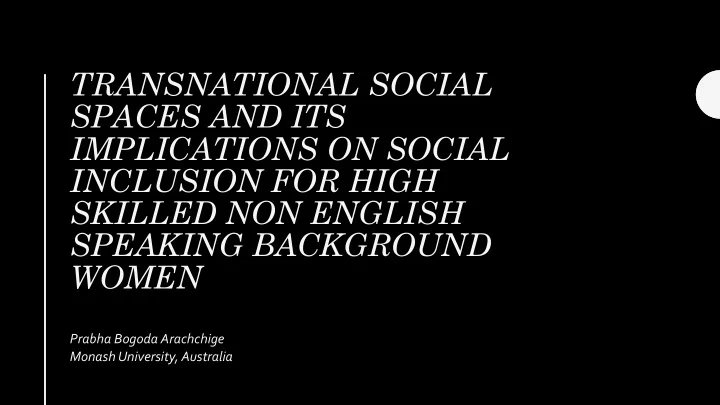

TRANSNATIONAL SOCIAL SPACES AND ITS IMPLICATIONS ON SOCIAL INCLUSION FOR HIGH SKILLED NON ENGLISH SPEAKING BACKGROUND WOMEN Prabha Bogoda Arachchige Monash University, Australia
• A fascinating puzzle: Is there a trade off between homeland link, and inclusion in Australia? • Why this puzzle matters? • Things we know and things we don’t know about this Contents puzzle from literature • Key theoretical frameworks • Methodology • Concluding comments
“I think sometimes people judge you from the nationality you are coming from. Life is difficult “Migrating to Australia was the best decision because you have to prove double the time that I made in my life. I am happy that I live in Australians would not prove them self, but we have a free country where I have freedom of to prove in each step where we go. we have to prove expression and peaceful life. My life in we are good, we have to prove we have knowledge Malaysia was not good as my life in of our field, we have to prove everything. Even Australia…I didn’t like the work culture and I behaving, anything they judge you, they have their was in an authoritative relationship. I left own opinions that .. Ah.. she is from a different Malaysia, looking for a better life in country, she does not know this, that makes you feel Australia…Now I am married to a Australian uncomfortable. I mean we all are human and its a and I have a carefree life. People welcome me human race, I feel, god made us all equal but we try and I feel more belonged in Australia” − to create a barrier and make ourselves superior” − Malaysian high skilled migrant women Indian high skilled migrant women
A fascinating puzzle: • Is there a trade-off between homeland link, and socio- economic inclusion in Australia?
• Extra pressure for NESB women in their new home to Why this preserve and continue their origin identity, coupled with puzzle experiencing discriminatory norms in the host society, results in a difficult and isolating settlement experience matters? • Host communities missing out on brain gain as highly skilled NESB women end up doing low skilled or 3D’s jobs • Populist ideas of inability of some new migrant communities to integrate into host communities
Things we Things we know: • Economic integration and labour market participation know and • Negotiation of existing social and cultural capital things we • Life trajectories of individuals Things we don’t know don’t know • Socio-cultural integration and social inclusion about this • Simultaneous pressure that women experience to conform to conflicting socio-cultural standards in two puzzle from places • Negotiation of class, gender and ethnicity in transnational literature social spaces and how this affects settlement in the host country
Key 1. Crenshaw’s intersectionality approach theoretical 2. Bourdieu’s notion of cleft habitus 3. Levitt and Schiller’s framework of transnational social frameworks fields
Epistemology: • Interpretive constructionist approach Methods: Methodology • Qualitative research design • 60 highly skilled migrant women from South Asia and South East Asia (20 women from India, Sri Lanka and Malaysia) • In-depth interviews • Qualitative (narrative) data analysis methods
• High skilled migrant women’s experiences of traversing two parallel fields to (re)negotiate and transform their lives in the host society has been overlooked by scholarship to date • So, to acknowledge and articulate these experiences is a Concluding difficult task comments • This project ties together a lot of previous work in a new direction • Will contribute to the larger gender and migration scholarship
THANK YOU!
Recommend
More recommend